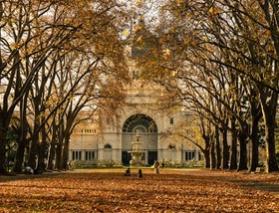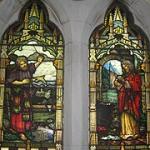
Abraham and his nephew Lot, with households and possessions, left Egypt for God’s promised land. They separated, as both needed extensive lands. Abraham let Lot choose. Attracted by abundant water and closeness to worldly Sodom, Lot pitched his tent facing Sodom. Abraham opened his tent toward the altar he built to sacrifice to God. Facing God or facing worldliness determined the earthly and eternal lives of these men—as it does for all.
Facing God on the Land
Lot built his house where he turned his face and his heart—in a wicked city. Abraham lived his life facing God: walking and talking with God, consulting continually with God. David A. Bednar spoke of such commitment.
A fundamental and permanent change in our very nature . . . true conversion brings a change in one’s beliefs, heart, and life to accept and conform to the will of God . . . and includes a conscious commitment to become a disciple of Christ.1
Without commitment, Lot was vulnerable. When combined armies of robbers descended on Sodom, Lot and his possessions were taken.
Prospering with the Lord’s guidance, Abraham and his servants marched out and saved the Sodomites. Those rescued accepted Abraham’s assistance, but not his beliefs or commitment to facing God.
Gomorrah’s citizens joined Sodom in wickedness. Hoping to hold off destruction, Abraham could not find even 10 facing God.
When two angels arrived at Sodom, Lot was sitting at the gate, not quite facing God. Lot couldn’t prevent violent Sodomites from breaking into his house, but the angels protected themselves by blinding the violent crowd.
The angels told Lot’s family, “Escape to the mountain lest ye be consumed.” But Lot’s family were not facing God. Half of his children refused to flee, and his wife looked back to Sodom, becoming salt on the mountainside.
Lot and his two surviving daughters escaped fire and brimstone, but suffered soul destruction along with loss of all “treasures.”
God’s covenant with Abraham “to be a father of many nations” has been and is yet being fulfilled, as have innumerable spiritual and eternal blessings.
Turning to Face God
Over 1500 years later and half a world away, two family members faced wickedness. As miracles came, both changed their lives by facing God.
A Father
Alma the Elder was a sinful priest to an even more sinful king. King Noah had eyes, thoughts, and heart set absolutely on power and possessions, luxury and lust. His priests joined him (see Mosiah 17-18).
But God sent a prophet, Abinadi, to call the kingdom to repent and turn to Christ. Abinadi’s words “He is the light and the life of the world; yea, a light that . . . can never be darkened . . . a life which is endless” changed Alma’s life.
Alma was then facing God, allowing eternal truth to fill his heart and mind, repenting of his sins, and writing all Abinadi’s words. King Noah condemned Abinadi to death by fire and sent servants to kill Alma.
Alma secretly taught all who would listen; soon 204 were facing God. Dodging the king and his servants, they gathered at a place with pure water, where Alma taught and baptized those who desired Christ’s covenant. They were blessed by the Spirit and the grace of God.
When the king came, they fled into the wilderness where life was uncertain and difficult, but they never turned their faces or their hearts from God. Eventually joining Mosiah’s kingdom in Zarahemla, Alma spent the rest of His life as high priest over the Nephite church.
A Son
One of Alma’s sons, also called Alma, persecuted the church. “A very wicked and an idolatrous man . . . stealing away the hearts of the people . . . allowing the enemy of God to exercise his power” (see Mosiah 27). Like his father, young Alma needed a miraculous conversion.
As he and four sons of King Mosiah were engaging in mischief, an angel spoke loudly to them: “Why persecutest thou the church of God?” The earth trembled, and the young persecutors fell.
For two days and two nights Alma lay helpless in his father’s house, unable to move or speak. When strength and voice returned, he was facing God.
After wading through much tribulation, repenting nigh unto death, the Lord in mercy hath seen fit to snatch me out of an everlasting burning, and I am born of God. My soul hath been redeemed from the gall of bitterness and bonds of iniquity. I was in the darkest abyss; but now I behold the marvelous light of God. My soul was racked with eternal torment; but I am snatched, and my soul is pained no more.
The younger Alma became a powerful missionary, succeeding his father as high priest leading the Nephite church. The Almas were two of the strongest spiritual leaders in Nephite history.
Keeping Faces Forward
As descendants of Abraham, the Almas learned of him from scriptures. Entire kingdoms turned from wickedness to face God taught by the four sons of Mosiah, who rebelled and repented with Alma the younger.
They went into a network of kingdoms living in violence. Murder was rampant—by kings and commoners But with Mosiah’s sons, miracles happened and hearts softened.
People converted and committed to Jesus Christ. They turned from facing weapons to facing God, burying their weapons in the earth. Dale G. Renlund explained, “a testimony to God . . . that they never would use weapons again.” 2
As the missionaries continued throughout the lands, many kingdoms, as mentioned by Elder Renlund, “promised to follow God’s teachings and never go back on their commitment . . . never falling away.”
When those rejecting God came against them, these converts prayed and let themselves be slaughtered. More than 1,000 invaders, touched by the faith and courage of those facing God, threw down their weapons and converted also. Not one convert ever fell away. Eventually joining Nephites, they continued facing God throughout future generations.
Dieter F. Uchtdorf summarized: “The Savior is the motivating power behind all that we do . . . and our ultimate destination. ”3
(featured image: Dall Col/Unsplash)













